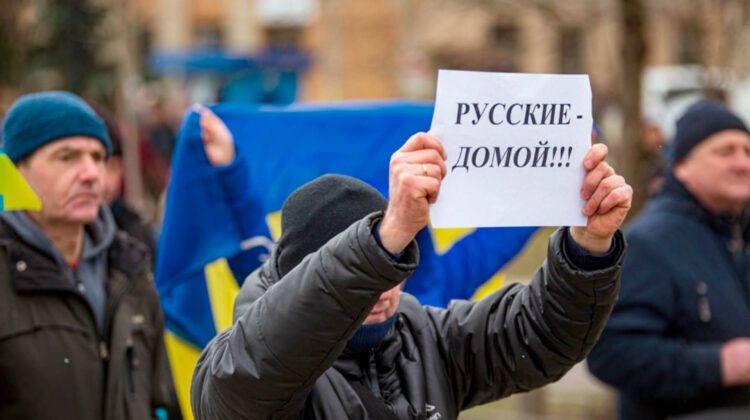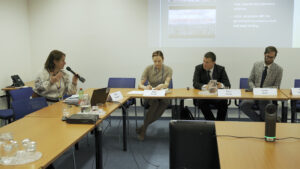Imagine for a moment that you have been deprived of the ability to do the usual routine things; to leave the house whenever you like, to walk wherever you like, to go to the cinema, museums, or the theatre, to drink coffee with friends at the corner café, to buy something at the shop, to go to a neighbouring town or to another country. When – in one moment – you find yourself under occupation, you lose everything that your life consisted of.
I agree, at first glance the items on this list do not seem to be of prime importance or so necessary that they are impossible to live without. But if the opportunity to do these simple things disappears immediately and overnight because of a war waged by a crazy country, believe me, it feels like the destruction of everything, the humanity that makes up the meaning of life. After all, it’s not just a war on your country, it’s a war on you personally.
And if you also experience fear, which you can literally feel physically, and anger, which grows every day, the result is an emotional mix that makes your life almost unbearable.
It’s also the monotony that kills you. It’s not life, it’s existence. At the same time, when you open up social media, you see that the vast majority of the world’s inhabitants continue to live their ordinary lives – going to theatres, traveling to exotic countries, falling in love, splitting up, and making plans.
In that moment you are particularly aware of exactly what you have lost and how limited your life now is. Looking back, many people I subsequently spoke to about this subject often told me more or less the same thing: whatever the case, the important thing is that you are not being shelled, the important thing is that your lives are not in danger. Better that, they said, than being bombed.
I don’t agree with that. Besides, there is always a threat to life under occupation, even if you don’t hear explosions at that moment. The threat is not as obvious as a bullet or a shell flying towards you, but it is no less real: the threat of falling into the hands of the occupier’s repression. And in this case anything can happen to you: torture, deportation to an aggressor-country, extrajudicial shootings, and so on. After the withdrawal of the occupying forces, all of this was confirmed, including torture chambers for children.
Igor Kuzmenko, a filmmaker and co-founder of the Drug Users News (DUNews) documentary studio, needs your help! Please make a donation today to support his work to produce a series of documentaries about the community of people who use drugs in Ukraine during the war. Movies about the people, organizations, and networks that save thousands of Ukrainians from death and give hope every day.
Or send any amount via bank transfer to one of the following accounts:
Igor Kuzmenko
JSC UNIVERSAL BANK, Kyiv, Ukraine
Euro account:
IBAN: UA103220010000026208334747018
SWIFT: UNJSUAUKXXX
USD account
IBAN: UA753220010000026206334939334
SWIFT: UNJSUAUKXXX
It is always important for me to know that I can somehow influence the events that happen to me. It is important for me, as much as possible, to be in control of my life. To be in control and to be able to choose. When the air-raid alarm sounds, I choose whether to go to shelter or stay at home. I choose whether to continue living in an area that is frequently bombed or to leave it.
Being able to make a choice is very important for a person. Living under occupation deprives you of this. We could not influence the situation on so many issues. It was really hard, and really scary. It is like a child’s nightmare, when something creepy grabs you with sticky tentacles and pulls you down into the darkness. You can’t move. It’s also a hell of a lot like the sensations described by Joanne Rowling in the Harry Potter books. I mean the feeling of encountering Dementors, the creatures guarding the magical prison of Azkaban. Dementors sucked the joy, the positive emotions, all the colours of life out of people and eventually killed them, robbing them of their souls. We were prisoners of Azkaban, and the damned Dementors roamed around us.
At the same time, despite the occupation, Kherson continued to live on. Spring was approaching. After a short break, bread was being sold again. Groceries began to appear on shop shelves, some of them Ukrainian, some imported from Russia. Spontaneous trade flourished: medicine, vegetables, fruit, meat, fish, water, cigarettes, alcohol – whatever you wanted, if only you had the money. Some goods had a rather exotic appearance, while others looked downright suspicious.
The tobacco products were particularly striking – cigarettes of strange appearance, with incredible names, without excise stamps, for which salesmen for some reason said that they were “from duty-free”. Some long-forgotten brands of cigarettes that used to be sold in the Soviet Union also made an appearance – Tu-134, Opal, Rodopi, Stewardess, blue packs of Cosmos, Marlboro. Who produced all of these goods? Most likely, it was partly some kind of contraband, and partly a product of craftsmen from the territories occupied by Russia of Luhansk and Donetsk regions.
There was, of course, an obvious, or perhaps unknowable, sense in this for the cigarette makers and purveyors. The invaders came to our country to drag it back in time, into the silly propaganda delusion of a great empire called the Soviet Union, where supposedly the brotherly peoples lived soul to soul and loved each other. There, in this Kremlin hallucination, the mythical Soviets were happy, but then lost that paradise to the perfidy of their enemies. Now it was returning to our lives, just as the old Soviet cigarette brands are returning. But these cigarettes caused nothing but disgust and a gag reflex. They smelled like straw and were impossible to smoke. They were disgusting. As, in fact, was everything the occupiers offered.
A man can do anything, as one Nobel laureate in literature said. During the occupation, natural exchange was widespread – people exchanged medicines for food and things for medicines in chat rooms. We ourselves acquired some medicines in this way too, such as headache pills or nasal drops. There were “money launderers” – people who, in the absence of ATMs and banks in general, cashed out of accounts. They charged a high percentage for this, up to 10% at the beginning of the occupation, but before the liberation, they cashed out the money without any interest. It should be noted that there were no queues at these “money launderers”, for the simple reason that the vast majority simply had nothing to withdraw from their bank accounts: the standard of living of people had plummeted. With the arrival of the occupiers, poverty, ruin and agelessness were spreading further and further across the city.
I am not a fan of television, but from the first days of the war the television in our house ran non-stop. From the end of February all the Ukrainian TV channels merged and broadcast in a telethon format. And even though internet – both mobile and from Ukrainian providers – was still available, we turned on the television every morning, turning it off only late at night. The TV not only provided us with the news, it was a kind of link, a bridge to Ukraine, a window to a free world. Its glimmering sound calmed us down and the confident voices of Ukrainian announcers inspired optimism. Not surprisingly, Ukrainian television, along with mobile communications and the internet, became the number one target of the invaders from the very first days of the occupation. They tried their best to silence it by imposing their propaganda, but it did not work. People around them continued to listen in their homes and flats to the voice of Ukraine.
As the days passed, the love of Khersonians for the “liberators”[1] did not grow, which was surprising to them; no flowers were given to them, no hugs or smiles were given to them when they met. Moreover, the collaborators were periodically blown up and shot. On the streets of Kherson the number of occupant checkpoints and vehicles marked Z and V[2] grew. Repression against the civilian population began – searches, checks of the contents of bags and phones on the streets and in public transport, raids, searches of homes and institutions. The occupiers broke into flats and houses.
They were looking for weapons, pro-Ukrainian literature, Ukrainian symbols, and any evidence of affiliation with the AFU and Ukrainian law enforcement agencies. In our entryway, for example, they broke into all the flats on the top floor, spent half a day cutting doors with a bolt cutter and smashing them with a sledgehammer. In the first weeks of the occupation, they even broke into the house of Katerina Gandzyuk, a Kherson activist who died long before the war. People were taken “to the basement”, beaten, and tortured. Information about missing persons began to appear – people would leave their homes to go to work or simply for a walk and disappear without a trace. The flywheel of repression was spinning.

But at the same time, resistance was also growing. Despite enormous pressure from the occupying authorities, despite the direct threat to life, despite armed soldiers and armoured vehicles, people with Ukrainian flags went out every day to the streets and squares of the city, blocked the roadways, chanted anti-Russian slogans and sang Ukrainian songs and the Ukrainian anthem.
How majestic it was! How beautiful those fearless people were! These manifestations of patriotism not only supported and inspired the residents of Kherson and the whole Ukraine, inspiring optimism and confidence, motivating people to resist, but also formed a clear message: Kherson is Ukraine!
This is how the whole world came to know about Kherson.
[1] One of the justifications for the invasion Russia is using in its propaganda is that they are liberating Russian-speaking people from the Ukrainian nationalists’ regime
[2] Signs of Russian army forces used in the war against Ukraine since 2022 and in Russian propaganda
Read the series by Igor Kuzmenko on how they survived the occupation in Kherson:












